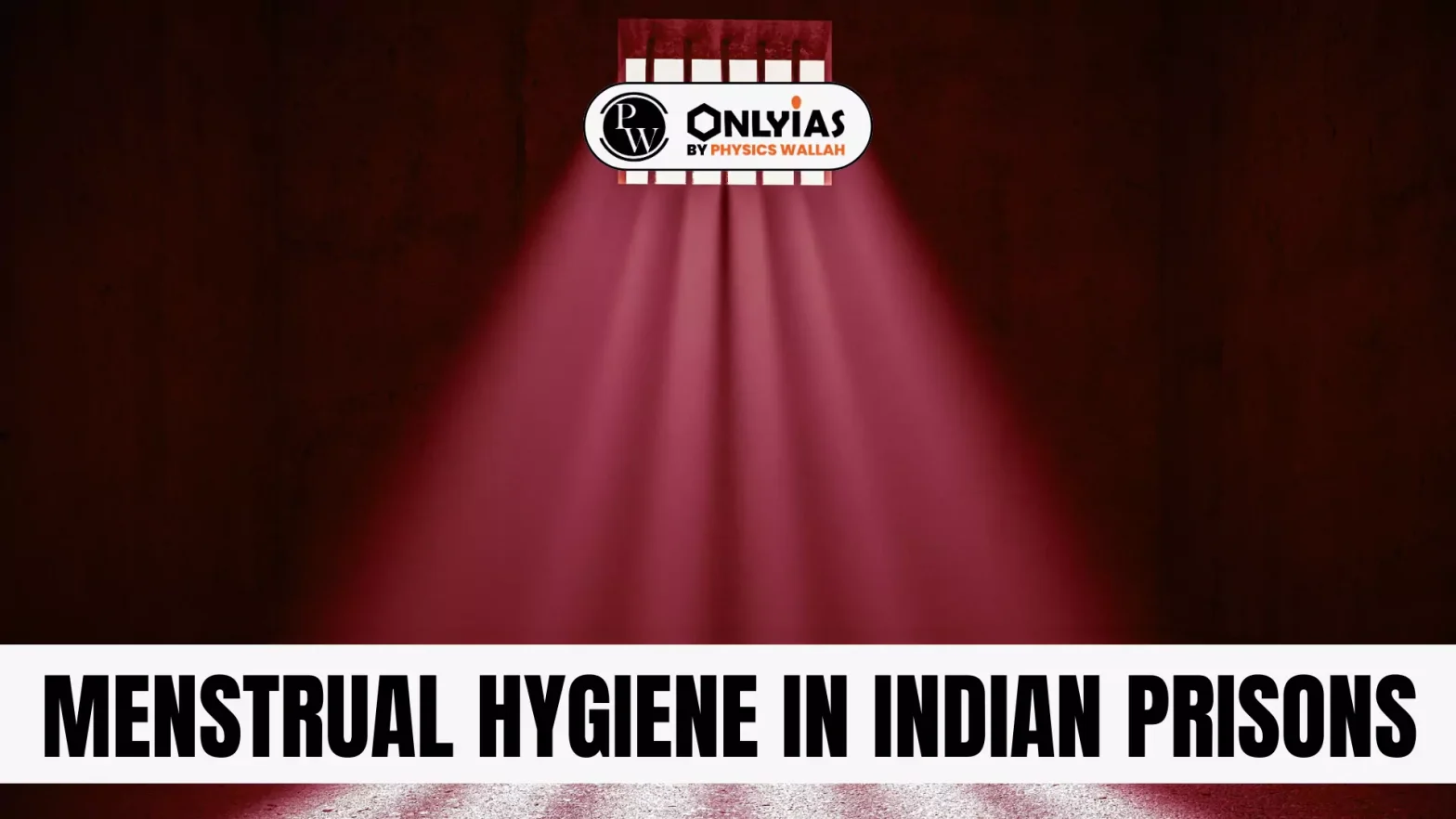Context
India has witnessed a promising shift in the landscape of menstrual hygiene management over the years.
Menstrual Hygiene in India
- NFHS Findings: The fifth round of the National Family Health Survey (NFHS 2019-2020) revealed that about eight out of 10 young women aged 15-24 years are now using safe menstrual hygiene products.
- Overlooked Condition of Marginalised Women: While urban areas and certain demographics have seen improved usage of menstrual hygiene products, the plight of one of the most marginalised populations – women in Indian prisons remains overlooked.
- Neglect of Women Prisoners: In a society where prisoners are deemed unworthy of fundamental rights, female prisoners face an even greater injustice.
- Society clings to an unrealistic standard of female purity, refusing to accept that women, too, can commit crimes.
- This bias has led to a systemic oversight and neglect of female prisoner’s basic needs, including menstrual hygiene.
Enroll now for UPSC Online Course
What is the Status of Menstrual Hygiene in Prisons?
- NCRB Findings: According to the National Crime Records Bureau (NCRB), there are 23,772 women in Indian prisons.
- Of them, 77% are in the reproductive age group (18-50 years) and are likely to be regular menstruators.
- However, the availability of sanitary napkins has been inconsistent across different prisons in the country.
- The quality of sanitary napkins has also been unsatisfactory.
- Recommendations not Implemented: Despite recommendations outlined in the 2016 Model Prison Manual, many States have not implemented provisions like supplying adequate water and washroom facilities for female prisoners.
- Lack of Access to Basic Necessities: Overcrowding and poor socio-economic conditions further exacerbate the struggle of incarcerated women to secure basic necessities such as water, sanitary napkins, detergent, and soap during menstruation.
- Case Study: A study conducted in a prison in Maharashtra in June 2023 revealed that water, sanitation, and hygiene facilities failed to meet the demands of women imprisoned there.
- This presents significant challenges for women, who need more water to maintain personal hygiene during menstruation.
- The study also found that prison authorities depended on sanitary napkins donated by non-governmental organisations (NGOs).
- Decisions about the type, quality, and quantity of menstrual absorbents were left to these organisations, often resulting in the supply of substandard products.
- Many women reported that the quantity of sanitary napkins provided was insufficient, and that the quality was poor (subpar absorption, causing discomfort, skin rashes, and infections).
- In one instance, the prison received a donation of ‘reusable’ sanitary napkins.
- Each woman was given only one pair to manage her entire menstrual cycle.
- With severely limited access to water and detergent, washing these reusable napkins after each use became impractical.
What have been Policy Interventions?
- Menstrual Hygiene Scheme : India has been making consistent efforts to improve access to menstrual hygiene products, especially among young women through the Menstrual Hygiene Scheme which includes the distribution of free or subsidised sanitary napkins.
- Improve Affordability: To make sanitary napkins more affordable for underprivileged women, the Suraksha Suvidha Napkins are also being sold at Jan Aushadhi Kendras for 1 per napkin.
- ‘National Menstrual Hygiene Policy: In 2023, India took an important stride forward by formulating the ‘National Menstrual Hygiene Policy‘, to recognise menstruation as a natural process that demands more meaningful attention.
- At its heart lies a crucial principle: ensuring equity in the safe and dignified management of menstrual hygiene.
- The Draft Policy States: Prioritise equity to enable all menstruating individuals, regardless of their socioeconomic status and geographical location, to have equal opportunities to access and manage their menstruation in a safe and hygienic way.
- Address disparities and barriers that prevent certain groups from accessing required menstrual hygiene products, resources and information.
- Remarkably, the policy identifies prisoners as a target population with a compromised access to menstrual hygiene facilities. This inclusion reflects a positive step forward.
- Shortfalls: However, the policy falls short of providing a concrete action plan to enhance menstrual hygiene management in prisons.
- It also overlooks the Ministry of Home Affairs as a critical stakeholder that influences menstrual hygiene management in prisons.
What Needs to be Done?
- Ensure Quality Standards: The Indian government must ensure that basic standards of menstrual hygiene for women in captivity are met.
- Uniform Implementation of Recommendations: The uneven implementation of the Model Prison Manual 2016 across States demands urgent attention as well.
- As a first step, the government must ensure every State adheres to the recommendations outlined in the manual.
- Fight Against Period Poverty: The experience of menstruation within prisons presents unique challenges that demand attention through a public health lens, particularly as part of the fight against ‘period poverty‘.
- Collaborations: The next step is to encourage collaboration between public health authorities and prison administrators to develop a comprehensive strategy to ensure access to adequate menstrual hygiene products and facilities while prioritising the health and dignity of women behind bars.
- Reseach and Studies: There is a dearth of empirical evidence, therefore, there is an urgent need to conduct research to understand the current state of menstrual hygiene within prison walls.
Enroll now for UPSC Online Classes
Conclusion
Ensuring menstrual hygiene for women in Indian prisons is crucial, demanding urgent action, standardized implementation, and collaboration to uphold their health and dignity.
![]() 29 May 2024
29 May 2024

